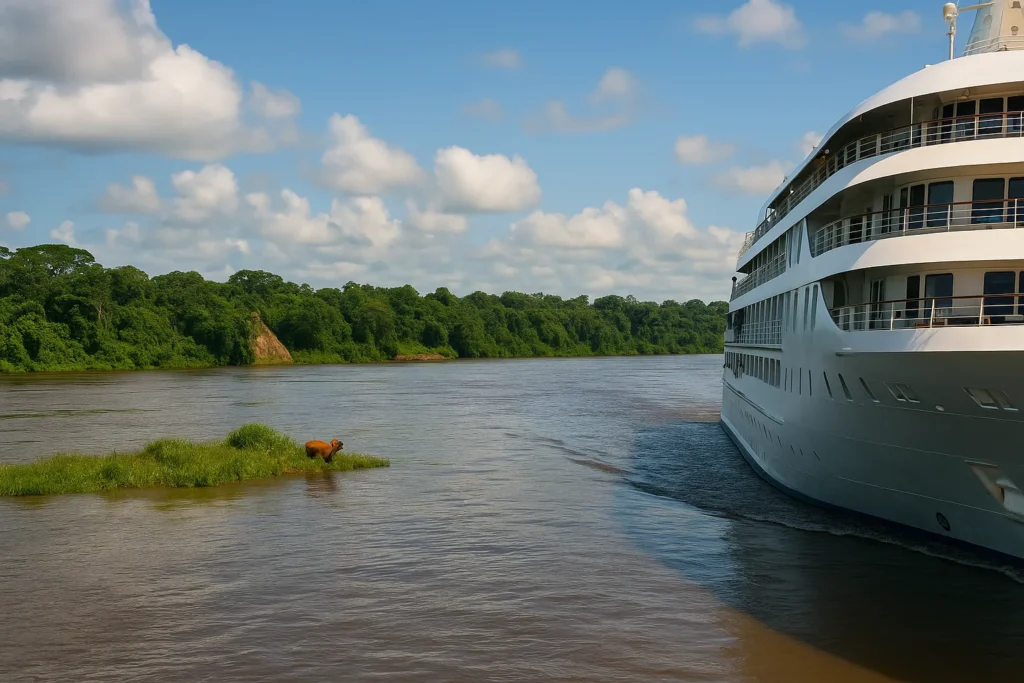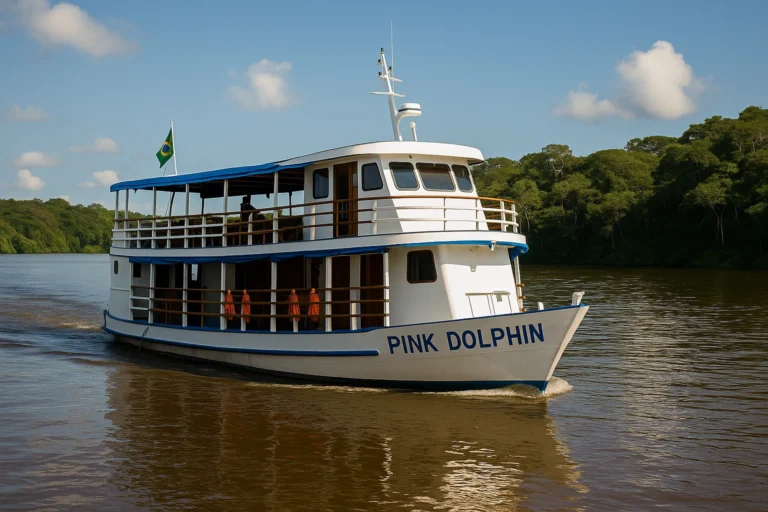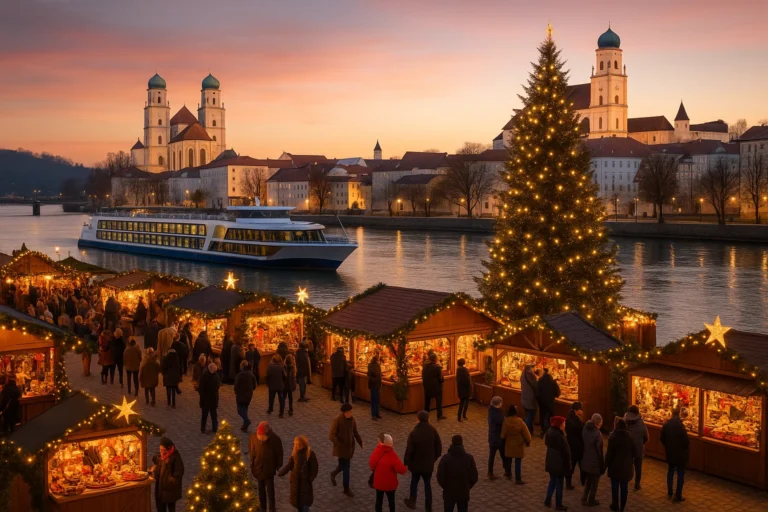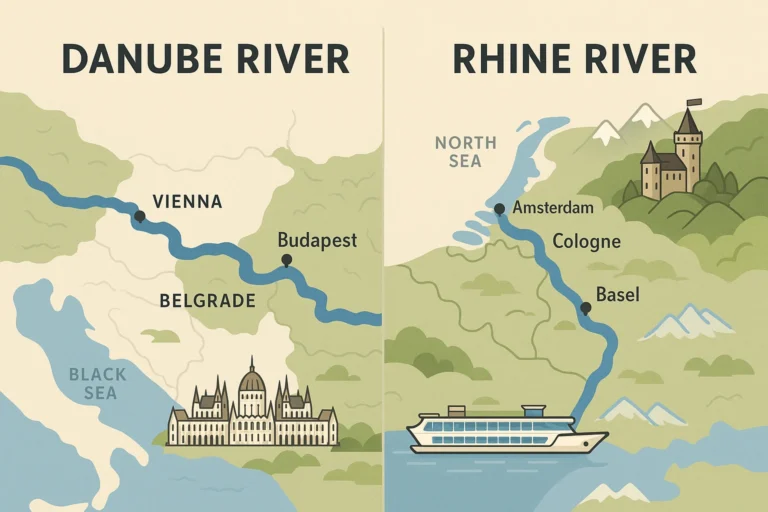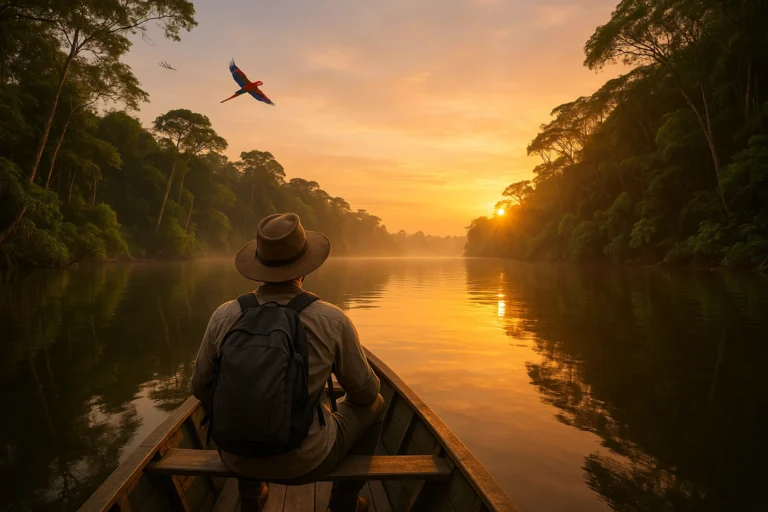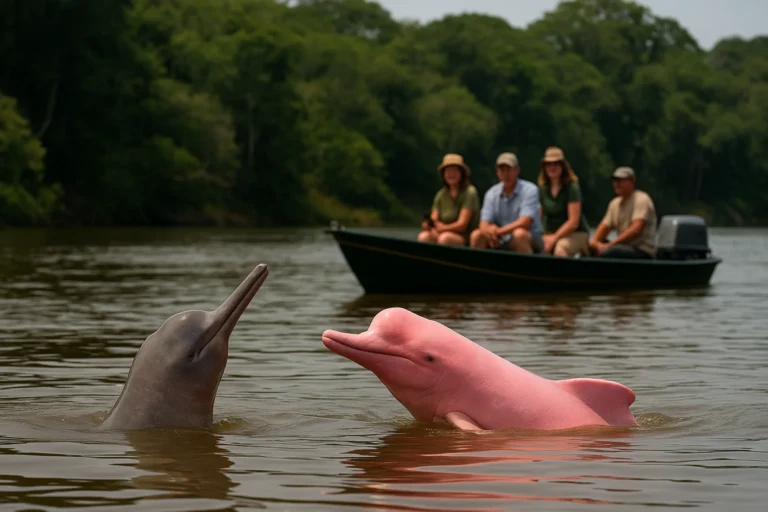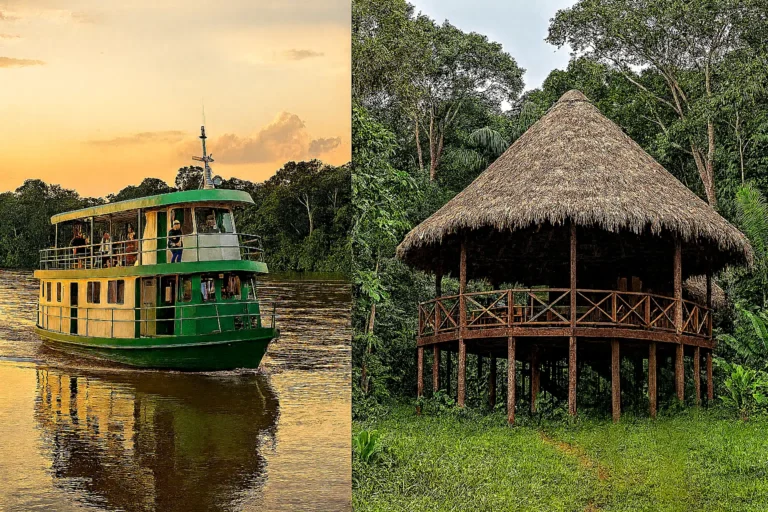Best Time to See Wildlife on an Amazon Cruise
🐾 Best Time to See Wildlife on an Amazon Cruise 🐾
Cruising through the Amazon isn’t just a vacation – it’s a front-row seat to the greatest wildlife show on Earth. From elusive pink river dolphins to howler monkeys echoing in the canopy, each season unlocks different parts of the jungle’s magic. But when exactly should you go to maximize your wildlife sightings? Let’s explore the Amazon’s distinct rhythms and seasonal changes to help you choose the perfect time for an unforgettable wildlife adventure. Understanding these patterns is key to experiencing the rich biodiversity of this incredible ecosystem.
🌊 High-Water Season (December to May)
During the high-water season, significant rainfall swells the rivers and floods large portions of the forest, transforming the jungle into a vast, navigable waterworld. This period is often preferred by those who want to explore deeper into the flooded forests by boat.
Wildlife Advantages:
- Easier access to **tree-dwelling animals** like sloths, various species of monkeys (e.g., capuchins, squirrel monkeys), and colorful birds like macaws and toucans, as they stay closer to the water’s edge.
- Ideal for **birdwatchers**, as many species are especially active, nesting, and easier to spot against the lush green backdrop.
- **Pink river dolphins** are frequently seen playing and hunting in the newly accessible flooded areas, offering incredible viewing opportunities.
- Fish are abundant in the flooded areas, which in turn attracts more predators like caimans and various bird species.
Activities:
- Extensive canoe and skiff excursions through the flooded forests, allowing for intimate exploration of the “igapós” (blackwater flooded forests) and “várzeas” (whitewater flooded forests).
- Unique photography opportunities from the water, capturing reflections and close-up shots of arboreal wildlife.
- Night safaris by boat offer chances to spot nocturnal animals, including caimans with their glowing eyes.
Things to Consider:
- Limited hiking opportunities due to submerged trails and pathways.
- Potentially more mosquitoes and other insects due to standing water – high-quality insect repellent is an absolute must.
🌿 Low-Water Season (June to November)
As waters recede, more of the forest floor becomes visible, and land wildlife is often easier to spot as animals congregate around remaining water sources. This season is perfect for those who prioritize hiking and land-based exploration.
Wildlife Advantages:
- Greater chance of seeing **terrestrial animals** like jaguars (though still rare, sightings increase), capybaras, tapirs, and giant anteaters, which are drawn to exposed riverbanks.
- Anacondas and various turtle species are often seen sunning themselves on the newly exposed riverbanks and sandbars.
- Visible nests and burrows in drier regions, offering insights into animal habitats.
- More accessible primary rainforest for deeper jungle walks, potentially revealing a different array of wildlife.
Activities:
- More opportunities for **hiking and land exploration** through the rainforest, reaching areas previously underwater.
- Access to deeper jungle trails allows for closer encounters with flora and fauna.
- Fishing for piranhas and other Amazonian fish is popular, especially in smaller, shallower channels.
- Visits to local communities and cultural interactions are often easier as trails to villages are clearer.
Things to Consider:
- Some smaller tributaries may be harder to reach by boat due to lower water levels, potentially limiting access to certain areas.
- Higher temperatures and humidity due to less canopy cover and stagnant air in some areas.
🗓️ So, When Should You Go?
Ultimately, the “best” time depends on your priorities. The Amazon is a dynamic ecosystem, and wildlife viewing is always a unique experience, regardless of the season. Each period offers distinct advantages:
- 🔸 May to October (Transition & Low Water) – Often considered balanced conditions, good for a mix of all activities, with comfortable temperatures and good wildlife visibility on land.
- 🔸 December to April (High Water) – Best for birdwatching, extensive river cruising, and seeing tree-dwelling animals and pink river dolphins.
No matter the season, something amazing is always happening in the Amazon. The sheer volume of biodiversity ensures that every day brings new discoveries and encounters. Consider what type of wildlife you prioritize seeing and the activities you wish to engage in most when making your decision.
🐾 Top Wildlife You Might Encounter on an Amazon Cruise
The Amazon rainforest is home to an astonishing array of creatures. Here are some of the most sought-after sightings you might be lucky enough to spot:
- 🐬 Pink River Dolphins (Boto) – Curious and playful, often seen near boats in both high and low water, particularly in protected areas.
- 🐦 Macaws and Parrots – Their vibrant colors and loud calls are an unmistakable part of the Amazon’s soundtrack, especially at clay licks.
- 🐒 Howler Monkeys – More often heard than seen, their powerful calls echo through the canopy, particularly at dawn and dusk. Other monkeys like capuchins, squirrel monkeys, and tamarins are also common.
- 🐍 Anacondas – While elusive, these large constrictors are more commonly spotted sunning themselves on riverbanks during low-water months.
- 🐊 Caimans – These alligator-like reptiles are frequently spotted along shores and are a highlight of night safaris, where their eyes glow in the flashlight beam.
- 🦋 Giant Water Lilies (Victoria Amazonica) – While not wildlife, these enormous aquatic plants are a natural wonder and provide habitat for various small creatures, especially visible during high-water season.
- 🦜 Three-toed Sloths – Often found slowly moving through the treetops, they blend in remarkably well and are a joy to spot.
🧳 What to Pack for an Amazon Wildlife Cruise
Preparing correctly for your Amazon adventure will significantly enhance your comfort and enjoyment. Here’s an essential packing list:
- 🎒 Binoculars: Absolutely essential for spotting distant wildlife high in the canopy or across the river.
- 🧢 Light, long-sleeved clothing: Opt for breathable, quick-drying fabrics in neutral colors to protect against sun and insects.
- 🦟 High-quality insect repellent: A strong repellent with DEET or picaridin is crucial. A mosquito hat or head net can also be beneficial.
- 👟 Waterproof hiking shoes/boots: Essential for wet landings and jungle treks. Sandals or flip-flops for onboard comfort.
- 📸 Dry bag for gear: Protect your camera, phone, and other electronics from moisture during skiff excursions.
- 🌧️ Lightweight rain jacket or poncho: The Amazon rainforest experiences rain throughout the year, so be prepared for sudden showers.
- 🔦 Headlamp or small flashlight: Useful for night walks and navigating cabins after dark.
- 🧴 Sunscreen and hat: Protection from the strong equatorial sun.
- 💊 Basic first-aid kit: Include any personal medications, anti-diarrhea medicine, and pain relievers.
❓ Frequently Asked Questions (FAQ) – Amazon Wildlife Cruises
Can I see wildlife year-round in the Amazon?
A: Yes, absolutely! The Amazon is teeming with life year-round. While the types of wildlife you might easily spot can vary by season (e.g., more tree-dwelling animals in high water, more terrestrial animals in low water), there is always something incredibly active and fascinating to observe, from diverse birdlife to playful primates and impressive reptiles.
Is it safe to visit the Amazon during the rainy season?
A: Yes, it is generally very safe. Guides are highly trained and experienced in navigating the seasonal changes, and the cruise boats are specifically adapted for varying water levels. The “rainy season” often means heavy but short bursts of rain, followed by sunshine, rather than continuous downpours. Always choose a reputable tour operator with experienced guides.
Which Amazon area is best for cruising?
A: The “best” area depends on your preferences. The Peruvian Amazon, particularly near Iquitos, is highly regarded for its rich biodiversity, excellent wildlife viewing opportunities, and a good mix of luxury and adventurous cruises. The Brazilian Amazon (e.g., near Manaus) offers grander rivers, while the Ecuadorian and Colombian Amazon provide more remote and intimate experiences. Each offers a unique perspective of the jungle.
What kind of clothing should I wear in the Amazon?
A: Lightweight, long-sleeved shirts and long pants are recommended to protect against sun and insects. Quick-drying fabrics are ideal. Earthy tones (greens, browns, grays) are best for wildlife viewing. Avoid bright colors. Comfortable, broken-in waterproof walking shoes or boots are essential, along with a pair of sandals for onboard comfort.
📂 Explore More in These Categories
Amazon River Cruises 2025: Rainforest Wildlife & Tribal Visits
🧭 Final Thoughts
A cruise to the Amazon rainforest is an unparalleled adventure, offering a deep dive into one of the planet’s most vibrant ecosystems. Whether you choose the high-water season for intimate explorations of flooded forests or the low-water season for more land-based wildlife encounters, the Amazon promises a magical journey. By understanding the seasonal rhythms and preparing appropriately, you’re set to witness nature truly come alive in this incredible wild frontier. It’s more than just a trip; it’s an immersive experience that will connect you deeply with the raw beauty and astounding biodiversity of our planet.
💬 Share Your Dream!
Which Amazon animal would you most love to see in the wild? Have you already experienced an Amazon cruise? Leave a comment below and share your dream Amazon experience or your unforgettable memories! We’d love to hear from you. ✍️👇


